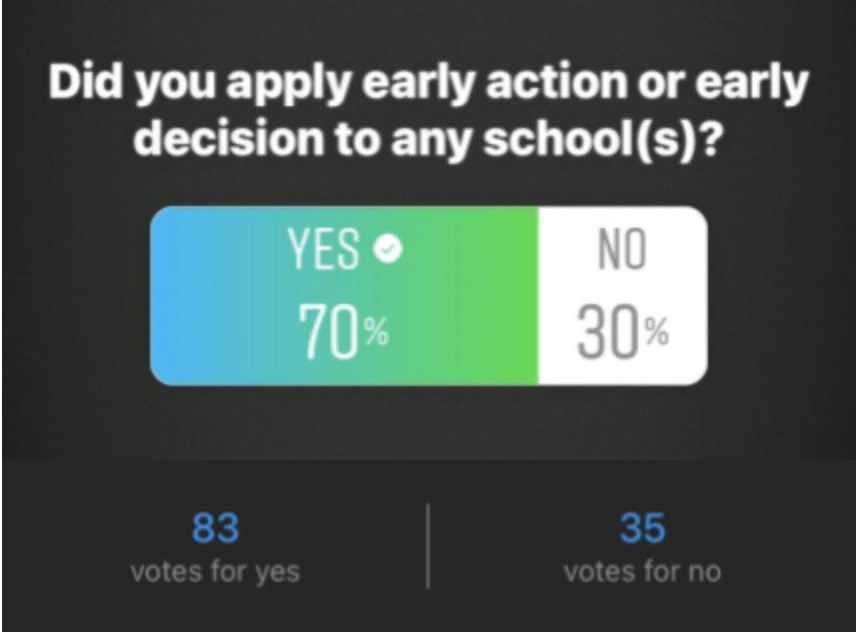Early decision/early action changes drastically in 2020-2021
In a survey conducted of 118 Amador Valley High School seniors, 70% stated that they applied to a university through early action or early decision admissions.
In the 2020-2021 school year, the number of early action and early decision (EA/ED) applications to colleges across the country has significantly increased, but the acceptance rates have gone down. These trends can be partially explained by the vastly different circumstances under which students are applying in this application year.
When choosing whether to apply early action, many students opted to apply early to as many schools as possible in order to receive decisions sooner without being committed to that school.
“The main reason I applied early to every school possible was to get the stress of college applications out of the way! I started doing research pretty early, so I had known what I was looking for in my ideal school. By applying early action, I was able to (…) hear most decisions quicker and just have a greater peace of mind earlier in the year!” said Lauren Sowers (‘21).
On the other hand, because early decision is a binding agreement, students have to carefully consider whether they are prepared for that commitment and the financial considerations that come with it.
“I think someone should ED to a school if and only if they are bent on going to a school (…) I think that not financially secure individuals shouldn’t ED because they could be locked into a very expensive school, when they could have gotten a similar education in a public school for much less,” said Jeffrey Sun (‘21).
During the pandemic, students are also no longer able to attend in-person campus tours or speak with current students at the schools they are interested in, a shift that has impacted seniors differently.
“I really want to attend a school on the East coast and so many of the schools I applied to are ones that I have never actually visited. However, I know that for many people, it was very difficult having to apply to schools that they never visited,” said Nikita Bondale (‘21).
On the other hand, knowing someone who goes to your dream school or reaching out to alumni through the university’s social media can help students decide whether to commit to a school. Most colleges are also offering virtual tours so students can get a feel for the school without attending an in-person tour.
“Even though I couldn’t visit any campuses, I found that talking to current students and alumni from the schools I was interested in was helpful,” said Vivien Song (‘21).
The impact that remote learning had on the junior year grades of many current seniors has also caused them to carefully evaluate whether to apply early.
“Because second-semester junior year gut-punched many students when it comes to grades, they may want to wait until they can get their first-semester senior year transcripts and apply for regular decision,” said Uma Maveli (‘21).
Additionally, the unpredictable rise and fall in the number of COVID-19 cases across the country can also cause students to feel uncomfortable with attending an out-of-state school where they are not as familiar with the surrounding area and state’s safety precautions.
“I can see someone who is very COVID conscious regretting ED. If they committed to an out of state school, then found out that the numbers in that area were getting bad, that would be a terrible feeling. With all of this unsureness, I value the late commitment day,” said Megan Schuerlein (‘21).
However, this uncertainty during the pandemic may be the very cause of the rise in early action applicants, which allows for students to receive decisions much sooner and not worry about committing to a college they are unsure about.
“I definitely think that more students than ever before have applied early to schools. I think a large part of this significant increase in applications is due to the fact that students are looking for early assurance in a process that undoubtedly causes stress during a time when the country is facing unprecedented instability,” said Simmy Mukherjee (‘21).
The financial considerations mentioned previously may be exacerbated by the negative impact of the pandemic on the livelihoods of hundreds of families across the country, forcing certain students to reconsider whether they can commit to an expensive school.
“I think that students may be struggling to make a commitment because of financial factors. Perhaps due to COVID, their parents lost their jobs, and now the family can not financially support sending their child to college,” said Ana Pachuca-Rodriguez (‘21).
In general, the decision to apply to college is often accompanied with mixed feelings because students will most likely have to move away from their parents and can be placed in a completely new environment if they choose to attend an out-of-state college.
“We’ve lived with our parents our entire lives (…) And to know that we might not have that protection and familiarity anymore is really scary for most of us. I obviously am impacted by this as well, however I’m really excited to be allowed to be more independent and explore the world and a new location by myself,” said Julia Smith (‘21).
Ultimately, going to college is a major turning point in a student’s life and high school seniors must brace themselves for a dramatic change after being isolated during the pandemic.
“I think with everything being so shut off for over a year, it may be difficult to be directly thrown into college. It’s definitely going to be something people will have to get used to–and may take time in doing so,” said Devang Deshpande (‘21).
Your donation will support the student journalists in the AVJournalism program. Your contribution will allow us to purchase equipment and cover our annual website hosting costs.

